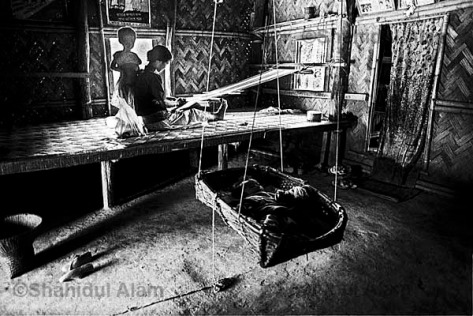
Mother and Child in Bandorban. Poster above window is part of blindness prevention campaign of UNICEF. © Shahidul Alam/Drik/Majority World
Statement: His eyes flitted forward and back, and having surveyed the scene for possible danger, it stopped. The head stooped, and that was how he stayed. Crouched on the floor of a bus full of Bangalis, the Pahari (hill person) amongst us, was living in occupied land. Keeping out of trouble was his best chance for survival.
It was only when the uniformed men with guns boarded the bus and prodded him that he raised his eyes. Scared, tired, hurt, angry eyes. But he knew enough to not express his anger. Meekly he obeyed the commands. His humiliation was also ours, but we did not complain. We were tourists in our own land, but the constitutional guarantees enshrined in our laws, while not fully respected anywhere, was particularly absent here. As well-connected Bangalis, we were far more safe than he was. But the rules of occupation are never generous, and they had guns. They left. We breathed more easily. He continued his journey with his head bowed. I took no photographs.
Walking through Rangamati as Bangali tourists was a disconcerting feeling. Many of the Bangalis here were also poor. Displaced from their homes in far away places, they had been dumped here with promises of a happy life. Left to fend for themselves, they joined the power chain well above the Paharis, but very low down all the same.
At the top of the chain was the military. Then the wealthy Bangalis, the ones who made the deals, then came the Paharis who had sided with the government. The Bangali settlers (the poor ones anyway), were quite a bit further down. The Paharis never dared to reach for the rungs of that ladder.
Rangamati was still a beautiful place. The homes buried beneath the lake when the Kaptai Dam was built, the tropical rain forests that had been destroyed, the hill people who were forced to leave their ancestral land, were things that never made it to our history books. The Hill Tracts featured in the picturesque postcards and tourism ministry books and the well rehearsed cultural programmes in the government Tribal Centre.
Occasional photographers from the lowlands came to discover the ‘authentic tribal lifestyle’. A bare chest woman bathing by a waterfall, backlit women with children strapped on their backs, a wrinkled old woman smoking a pipe and other photographic trophies were potential award winners.
As anticipated, the tiktikis (lit: geckos, local term for government spies, generally members of ‘Special Branch’) soon found us. They followed us everywhere. Asked stupid questions. Made notes. Questioned the people we had spoken to or visited. We consciously stayed away from friends. No point in getting them into trouble.
At a later visit, Drik’s printer Nasir and I had gone to Bandorban. Amongst the photographs I’d taken on that trip was this one of a mother weaving. Perhaps I was repeating what the trophy hunters had done, but the poster above the window, part of a UNICEF blindness prevention campaign, had words that seemed poignant. “hai re kopal mondo, chokh thakite ondho’. (oh what irony we find, we have eyes but are blind.)
BIO:
Shahidul Alam was born in 1955 in Dhaka, Bangladesh. He studied and taught chemistry in London where he obtained a PhD (Doctor of Philosophy) from the University of London. He started photography in 1980 and was awarded the Harvey Harris Trophy for being judged the best photographer of the year by the London Arts Council in 1983. He became the president of the Bangladesh Photographic Society where he served for three terms. In 1989 he set up Drik picture library and Pathshala: South Asian Institute of Photography. He is also a director of Chobi Mela, the festival of photography in Asia. Jury member of numerous competitions including World Press Photo where he has been a judge on four occasions, he was the first person of colour to chair the international jury in World Press Photo history. Awarded the Andrea Frank Foundation Award and the Howard Chapnick Award in 1998 he has also been awarded the Honorary Fellowships of the Bangladesh Photographic Society and later, the Royal Photographic Society in 2001, for his contribution to photography. He is on the advisory board for the W. Eugene Smith Memorial Fund and the National Geographic Society. He is visiting professor of Sunderland University in the UK and Regent’s Lecturer at UCLA in the USA. Alam is the founder chairman of Majority World, a global community interest initiative formed to provide a platform for indigenous photographers, photographic agencies and image collections from the majority world to gain access to global image markets.
Web: www.shahidulnews.com